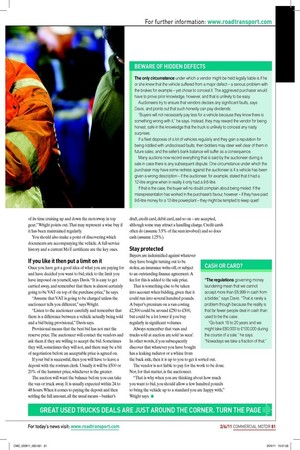BEWARE OF HIDDEN DEFECTS
Page 44

If you've noticed an error in this article please click here to report it so we can fix it.
The only circumstance under which a vendor might be held legally liable is if he or she knew that the vehicle suffered from a major defect – a serious problem with the brakes for example – yet chose to conceal it. The aggrieved purchaser would have to prove prior knowledge, however, and that is unlikely to be easy.
Auctioneers try to ensure that vendors declare any significant faults, says Davis, and points out that such honesty can pay dividends.
“Buyers will not necessarily pay less for a vehicle because they know there is something wrong with it,” he says. Instead, they may reward the vendor for being honest, safe in the knowledge that the truck is unlikely to conceal any nasty surprises.
If a fleet disposes of a lot of vehicles regularly and they gain a reputation for being riddled with undisclosed faults, then bidders may steer well clear of them in future sales; and the seller’s bank balance will suffer as a consequence.
Many auctions now record everything that is said by the auctioneer during a sale in case there is any subsequent dispute. One circumstance under which the purchaser may have some redress against the auctioneer is if a vehicle has been given a wrong description – if the auctioneer, for example, stated that it had a 12-litre engine when in reality it only had a 9.6-litre.
If that is the case, the buyer will no doubt complain about being misled. If the misrepresentation has worked in the purchaser’s favour, however – if they have paid 9.6-litre money for a 12-litre powerplant – they might be tempted to keep quiet!














































